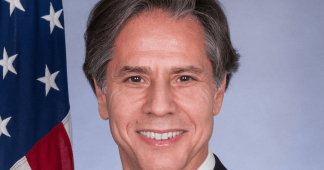The neoconservatives who rebuffed the Republican establishment’s warnings about the perils of war in Iraq have now opened another front —against President Barack Obama.
By Jacob Heilbrunn
Oct 20, 2012
The neocons, unlike the muscular Democrats who led the U.S. into the Vietnam War—including Defense Secretary Robert McNamara and Secretary of State Dean Rusk— are not reflecting about what went wrong in Iraq. Nor are they dodging the public spotlight.
They have instead signed on as foreign policy advisers for Republican presidential nominee Mitt Romney. He is now strongly denouncing Obama as an abject failure, intent on appeasing the world’s dictators. Romney, who has scant foreign policy experience, is now championing a new “American Century,” featuring a pre-emptive foreign policy agenda, a $2-trillion increase in the Defense budget and, most likely, hostilities with Iran — not to mention skirmishes with China and Russia.
Ever since these once hawkish centrist Democrats denounced President Jimmy Carter and signed on with Ronald Reagan in 1980, they have sought a president who would carry out their grandiose dreams: giving Israel carte blanche and exporting democracy, by force if necessary, around the globe. In George W. Bush they found him—a credulous president who denounced an axis of evil.
But with the Iraq war, their doctrines became discredited until the very word “neocon” morphed into a term of abuse. Now, however, these unrepentant ideologues are seeking another chance to promote their militant doctrines – and have discovered a fresh champion in Romney.
Romney recently praised former Vice President Dick Cheney as a “person of wisdom and judgment.” For his advisers are a phalanx of neoconservatives who actively worked with Cheney in the George W. Bush administration.
Yet, for all Romney’s skill at turning around faltering businesses, this neo-con attack on the Obama foreign policy looks like one enterprise that is bound to fail. Instead of reviving his campaign, Romney’s embrace of the neocons is sabotaging it. Romney may be good for the neocons — but they are not good for him.
Neocons who have clambered on board the Romney campaign include Bush administration officials Dan Senor, who served as spokesman for the Coalition Provisional Authority in Iraq; John Bolton, a former ambassador to the United Nations, and Elliott Abrams, a former deputy national security adviser for global democracy.
The neocons in the Romney camp appear to be focused on blanket support for Israeli Prime Minister Benjamin Netanyahu and confrontation with Russia, China and, above all, Iran.
Abrams, writing in the Weekly Standard, for example, declared that Congress should pass a resolution authorizing the use of military force against Iran. Senor said on CBS’ “This Morning” last month that America “looks impotent” because Obama has failed to topple Syrian President Bashar Assad.
Both Abrams and Senor are also giving Republican vice presidential candidate Paul Ryan, who recently decried Obama’s absence of “moral clarity” in foreign affairs, a neocon buffing.
Yet Romney’s adoption of the neocons could be boomeranging. During the former Massachusetts governor’s maladroit trip abroad this summer, Senor declared in Israel, “If Israel has to take action on its own, in order to stop Iran from developing that capability, the governor would respect that decision.”
The Romney camp ultimately had to walk back this provocative statement. But Romney, who declared in his infamous behind-closed-doors video that the Palestinians have “no interest” in peace, presumably believes in it.
Romney, in his second presidential debate with Obama, flirted with disaster when he pointed to the attack on the U.S. consulate in Benghazi to press the tired, and bogus, neocon line that Obama is a wuss when it comes to confronting terrorism.
Instead of engaging in a semantic debate about whether Obama described the attack as an “act of terror,” Romney would have been wiser to attack Obama on the more substantive grounds of competence.
Overall, Romney would be better-served if he listened to the few establishment advisers in his camp, including Robert Zoellick, former deputy secretary of state and World Bank head, who, not surprisingly, is loathed by the neocons for his reasoned approach to foreign policy. Zoellick is also castigated as a protégé of former Secretary of State James Baker, the neocon bogeyman because of his criticism of Israel’s West Bank settlements.
There are no signs, however, that Romney is seriously deviating from neocon orthodoxy.
So when Romney debates Obama on foreign policy on Monday night, he will likely be walking straight into a trap of his own making. Romney wants to portray Obama—who approved the daring raid in Pakistan that killed Osama bin Laden—as a warmed-over Carter.
But in caricaturing Obama, who has pursued a prudent and cautious course in foreign policy, Romney is providing further evidence that he is living in the past by endorsing the failed policies of the Bush administration.
In the final debate Monday, Obama will surely pound home the theme that Romney would likely mire the U.S. in new and unpopular wars in both the Middle East and Asia.
Whether Romney as president would actually pursue the neo-con piffle he’s been touting is an open question. But given that 17 of 24 of his top foreign policy advisers served in the Bush administration, as Foreign Policy noted, it would be a big gamble to bet against it.
Romney as president, for example could face an uproar in his own ranks if he tried to restrain Israel from attacking Tehran. He may discover that the only thing the neocons are essentially loyal is their malarkey about reinventing the Middle East overnight.
So, if Obama defeats Romney would the neocons finally disappear? Not a chance.
Their policies may have led to catastrophe in the Middle East, but they have become a permanent part of the Washington establishment. They now have sturdy perches at the American Enterprise Institute, Fox News and the Weekly Standard, among others.
Instead of folding their collective foreign policy tents, the neocons will likely latch onto a fresh candidate, like Paul Ryan or Sen. Marco Rubio (R-Fla.) to espouse their credo in 2016.
It’s not as if the neocons are actually making a comeback. They never really left.
PHOTO: Republican presidential nominee Mitt Romney and John Bolton, former U.S. ambassador to the United Nations, share a laugh. Jason Reed / Reuters
We remind our readers that publication of articles on our site does not mean that we agree with what is written. Our policy is to publish anything which we consider of interest, so as to assist our readers in forming their opinions. Sometimes we even publish articles with which we totally disagree, since we believe it is important for our readers to be informed on as wide a spectrum of views as possible.











